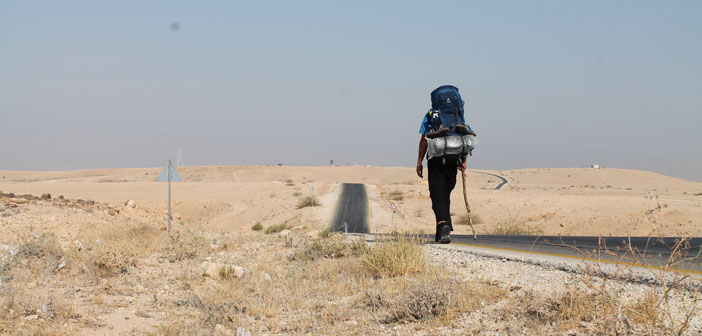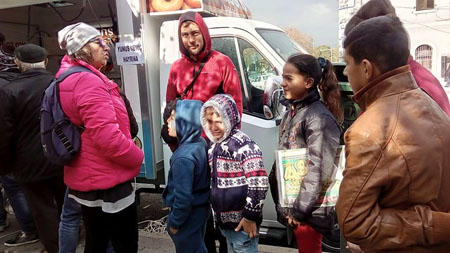Ürdün’den Hırvatistan’a uzanan bir dayanışma yolu


Thomson Reuters Vakfı’nın geçtiğimiz günlerde yayımladığı son araştırma, dünyada yaşanan mülteci krizini çarpıcı verilerle ortaya koyuyor. Yapılan araştırmaya göre, 2015 sonu itibariyle dünyada 65 milyon insan zorla yerinden edildi, 21 milyonu mülteci olarak başka ülkelere gitmek zorunda kaldı. Birleşmiş Milletler (BM) önümüzdeki sene 1 milyon 200 bin insanın daha yerinden edileceğini öngörüyor. Yaklaşık 370 bin göçmen Avrupa’ya, çoğunlukla deniz yoluyla ulaşmayı başarırken yaklaşık 5 bin göçmen bu uğurda hayatını kaybetti. Göçmenlerin yaklaşık 173 bini Yunanistan üzerinden Avrupa’ya varırken yaklaşık 75 bin göçmense Balkan ülkelerinde sıkışmış durumda. 2016’da Macaristan gibi Balkan ülkelerinin sınırlarını kapatmasıyla mahsur kalan göçmenler yine bir kış yaklaşırken bilinmezlik içinde bekliyor.
Goran Blažević, sınırını kapatan Balkan ülkelerinden birinde, Hırvatistan’da yaşıyor. Ülkenin kuzeydoğusundaki Umag şehrinde yaşayan 33 yaşındaki bu genç, yaklaşık iki ay önce, Avrupa’ya gelmeye çalışan mültecilerle dayanışma amacıyla sessiz bir dayanışma yürüyüşüne başladı. Hayatının yarısını seyahat etmek için para kazanarak, yarısını da yayan yürüyerek seyahat ederek geçiren Blažević, kendi ülkesinin mültecilere yönelik tavrının bu yol fikrini şekillendirdiğini söylüyor: “ Hırvatistan hükümeti 2015 yılında mültecilerin ülkeye gelmesini sıcak karşılamıştı; barınabilmeleri için kamplar hazırladı, ihtiyaçlarını karşılamak için çalışmalar yaptı. Fakat 2016’da hükümetin değişmesiyle bu tavır da değişti. Mülteciler sınırda durdurulmaya başlandı. Kendi ülkemde kampları ve gönüllüleri ziyaret etmek istedim ama imkansızdı. Böylece Hırvatistan ve genel olarak Avrupa ülkelerinde yaşayan insanlarda mülteci meselesiyle ilgili hem ırkçı bir yaklaşım hem de korku olduğunu fark etmeye başladım.” Bu farkındalık neticesinde Blažević, Ortadoğu’dan Avrupa’ya doğru giden mültecilerin yolunu takip etme kararını vermiş ve ilk durak Ürdün’ün 2 bin 500 yıllık antik kenti Petra olmuş. ‘Dayanışma yürüyüşü 4 km/s’ ismini verdiği bu yürüyüş yolunda neden ilk durağın Ürdün olduğu sorusuna cevaben, dünyada en fazla sayıda mülteci nüfusuna ev sahipliği yapan ülkelerden birinin Ürdün olduğu cevabını veriyor Blažević. Seçimin bir nedeni de Ürdün’ün çoğunluğunun Müslüman olması. Böylece, Avrupa’da özellikle medyanın yanlış aktardığı ‘Müslüman mülteci’ imajının gerçekte nasıl olduğunu da deneyimlemek istediğini belirtliyor.
 Bugünlerde İzmir’de olan Blažević, Türkiye’deki Suriyeli göçmenlerle ilk karşılaşmasını yaşadığını, sokakta göçmen bir aileyle tanıştığını söylüyor.
Bugünlerde İzmir’de olan Blažević, Türkiye’deki Suriyeli göçmenlerle ilk karşılaşmasını yaşadığını, sokakta göçmen bir aileyle tanıştığını söylüyor. Rotanın devamında Türkiye ve Balkan ülkeleri varmış fakat Balkan ülkeleri sınırları birer birer kapatınca rota da değişmek zorunda kalmış: “Türkiye’den sonra Yunanistan, Makedonya, Sırbistan ve Macaristan’ı takip etmeyi planlamıştım. Fakat Makedonya’da sonra Arnavutluk üzerinden devam edeceğim gibi görünüyor, zira diğer ülkelerde mülteciler için sınırlar kapatılmış durumda, onlar da Arnavutluk üzerinden yola devam ediyor.”
Yıllardır devam eden ve Avrupa’nın genellikle göz ardı ettiği mülteci meselesine dikkat çekmek için başlatılan bu yolculukta şimdiki durak Türkiye. Blažević, iki aydır devam ettirdiği yolculuğunda Antalya, Denizli, Selçuk, Izmir ve Çanakkale üzerinden ilerleyerek Yunanistan’a gitmeyi, nihayetinde de 2017’nin mart ayında memleketi Umag’a varmayı düşünüyor. Türkiye’deki günlerinin nasıl geçtiğini, mültecilerle iletişime geçme imkanı bulup bulmadığını soruyorum; Türkiye’ye ilk bakışını atan turist cümleleriyle cevap veriyor: “İnsanlar yardımsever ve kibar. Ege kıyılarından manzara şahane.’ Bugünlerde İzmir’de olan Blažević, Türkiye’deki Suriyeli göçmenlerle ilk karşılaşmasını yaşadığını, sokakta göçmen bir aileyle tanıştığını söylüyor. Fakat dil onlara engel olmuş, pek de iletişim sağlanamamış. Bu Hırvat genç, belki çok büyük hedeflere sahip değil, ama yaptığının önemsiz olduğunu söylemek de zor. Çünkü uzun süredir Avrupa ülkelerinin ve mültecilerin yaşadığı toplumların çoğunun yapmadığı bir şey yapıyor: sadece yol deneyimi üzerinden olsa da mültecileri anlamaya çalışıyor.


